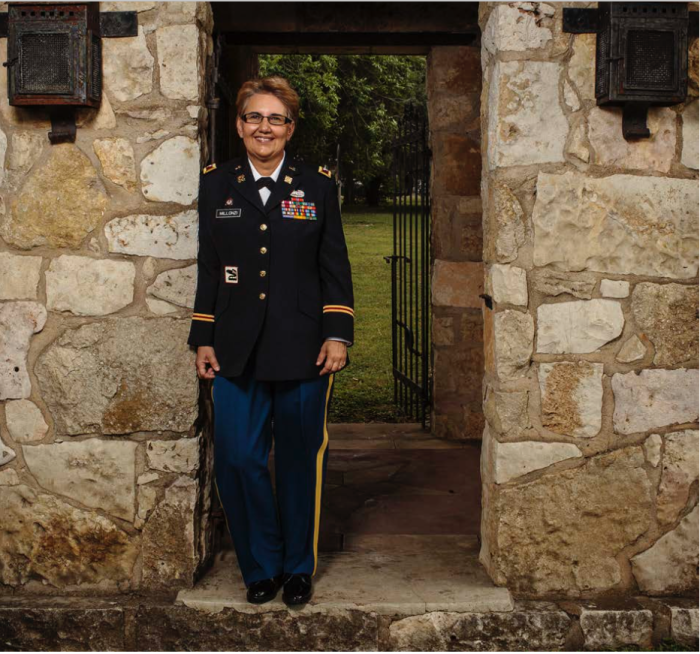After serving in the U.S. Army for 28 years, Colonel Cynthia Millonzi is fully out in all aspects of her life. The last person she needed to come out to was her general, and he didn’t even bat an eye when she told him. For 25 years, until the “Don’t Ask, Don’t Tell” policy was repealed, she kept quiet in order to serve and protect her country. Today, she is fearless.
“I’m at the end of my career, and I think it’s important for those of us who are leaders that are gay to step up and say it for everyone behind us, so they know that there is a large number of ‘us’. We’re here and serve proudly with honor,” she said.
Director of Manpower and Personnel at Camp Mabry, Millonzi is a logistics officer by training and a war veteran who served in Operation Iraqi Freedom. After using her logical and critical thinking left-brain for years in the army, she is happy to utilize her creative, expressive right brain when working with her partner, adult-contemporary musician Kit Holmes. Following years of suffering from wartime depression, Millonzi is finally living a happy and positive life that she found through spirituality.
In high school, Millonzi had a feeling she was different but didn’t realize she was gay until she was in college.
A native of Southern California, she went to college with a scholarship to study art. She had a talent for drawing and gave her art away to those who wanted it. The knowledge that she couldn’t make a living being an artist and the high expectation for her to keep creating caused Millonzi to stop altogether. Some time after she graduated from college, she joined the army. She had two reasons: One was that she was a single gay woman and the only way she knew she could receive benefits was from the military. The second reason was that she wanted to “run away” from California, travel and learn more about the world.
During the summer of 1985, at the age of 25, Millonzi was the second-oldest trainee during her basic training in Alabama. She suffered from heat exhaustion and dehydration because she wasn’t used to the humidity. Basic training was so physically challenging that she lost four dress sizes in those eight weeks.
Her time there for advanced training was also challenging, but for completely different reasons. “All the things you’ve heard about sexual abuse or assault in the military… happened to me while I was there. I was sexually assaulted by another soldier.” The 14 weeks she spent in Oklahoma was a living hell—everything that could go wrong, did go wrong. Millonzi said that in her mid-20s she was “naïve” and didn’t realize her male leaders would use their rank to solicit sex. Fellow soldiers ostracized her because it was her word against their leader’s word. She believes sexual assault on trainees was part of the military culture, as she experienced it before the infamous 1996 Aberdeen sex scandal that blew the whistle on male training personnel who sexually assaulted female trainees in Maryland.

Colonel Cynthia Millonzi
In 1986, Millonzi was stationed in Korea as a tactical communications specialist. It was during her time overseas that she was faced with the reality of the military’s zero-tolerance for “sodomy.” She was taken into questioning for an accusation that a female commander was gay, but it was determined to be untrue and she was taken off the hook.
That was just the beginning. Millonzi had to lie under oath and say she wasn’t gay in order to even begin her career in the military. She remembers being overseas and along with her coworkers burning letters from their partners back home. The letter burnings were a safeguard against potentially being outed. “A lot of my friends would have their cover boyfriend or date to take to military events. I couldn’t even do that. I couldn’t fake it,” she said.
Millonzi had come back to the U.S. and had been stationed in Washington state for a number of years when tragedy struck on 9/11. She knew immediately that her experience in the military would change. In 2003, her unit got the call that they would be deployed.
They were the second group to cross the border into Iraq. “You have no idea what war is really like until you get there, and when the bullets are real and the rockets are real and you’re faced with people dying and your own mortality, then a whole lot of things become really clear at that point.” As the personnel officer for her combat brigade, Millonzi was responsible for tracking three things: personnel, the mail and the casualties.
“When you first get the call, it’s your job and mission, whether you agree or not,” she said about the war. “There were always those nagging questions of ‘Should we have been there or not?’, but all we knew was that we had a job to do and we did it the best we could.”
When Millonzi returned home from Iraq, she had a hard time adjusting to civilian life. She was alone and everything in life seemed trivial. “I think the first two years after I came back from Iraq, I cried every single day.”

Kit Holmes & Colonel Cynthia Millonzi
She needed a change of pace. She accepted a job with the Texas National Guard and moved to Austin in 2008. After a year, it was at a spiritual center that she found solace and her partner, Kit Holmes, who sang at the church.
The two are excited that same-sex partners are finally being included in military benefits. By October of this year, Holmes will legally be allowed to become Millonzi’s beneficiary.
Holmes is eager to get the same benefits as her straight counterparts, but she admits it’s also a little daunting. “This is the real deal. You’re signing on the bottom line in front of the U.S. government.”




































